Reprimand Letter For Tardiness
[Your Name]
[Your Title/Position]
[Company/Organization Name]
[Address]
[City, State, ZIP Code]
[Date]
[Employee's Name]
[Employee's Position]
[Department/Division]
[Company/Organization Name]
[Address]
[City, State, ZIP Code]
Subject: Formal Reprimand for Tardiness
Dear [Employee's Name],
I hope this letter finds you well. I am writing to address a recurring issue that has come to our attention - your consistent tardiness to work. Punctuality is an essential aspect of our organization's values, and it is crucial for all employees to adhere to the company's policies and guidelines.
Over the past [insert duration], there have been [mention the number of instances or days] instances where you arrived late to work without valid justification. As an employee, it is your responsibility to report to work on time and ensure the smooth functioning of our team and the organization as a whole.
While we understand that occasional lateness may happen due to unforeseen circumstances, your consistent tardiness has begun to affect the team's morale and productivity. It also puts additional burden on your colleagues who have to cover for your absence until you arrive.
In order to maintain a harmonious work environment and ensure fairness among all employees, we must address this matter seriously. As a result of your recurring tardiness, I am issuing you a formal reprimand. Please be aware that this reprimand will be documented in your employee file.
Moving forward, we expect immediate and sustained improvement in your punctuality. To assist you in this matter, please consider the following steps:
1. Review and familiarize yourself with the company's policies and expectations regarding attendance and punctuality.
2. Identify any specific challenges that hinder your ability to arrive on time and address them promptly. If necessary, discuss any personal or work-related issues that may be affecting your punctuality with your supervisor or the HR department.
3. Set multiple alarms and reminders to ensure that you have sufficient time to get ready and commute to work.
4. Make necessary adjustments to your morning routine to minimize any potential delays.
5. In case of any anticipated delays, promptly inform your supervisor or the HR department so that appropriate arrangements can be made.
We believe in your potential as a valuable member of our team, and we hope that you will take this reprimand seriously and make a genuine effort to improve your punctuality.
Failure to demonstrate immediate and sustained improvement in your punctuality may result in further disciplinary actions, which could include more severe consequences.
If you have any questions or need assistance in resolving this matter, please do not hesitate to reach out to your supervisor or the HR department.
We trust that you will treat this matter with the utmost seriousness and professionalism. Your cooperation in this regard will be greatly appreciated.
Sincerely,
[Your Name]
[Your Title/Position]
[Company/Organization Name]
Formal Reprimand Letter for Chronic Tardiness
Subject: Reprimand for Repeated Tardiness
Dear [Employee Name],
This letter serves as a formal reprimand regarding your repeated tardiness. Despite previous verbal warnings, you have consistently reported late to work on [specific dates or frequency]. Punctuality is critical to maintaining workplace efficiency and fairness among colleagues.
Please be advised that further instances of tardiness will result in more severe disciplinary action, which may include suspension or termination. We expect immediate improvement in your attendance and adherence to scheduled working hours.
Sincerely,
[Your Name]
[Position]
[Company Name]
Informal Warning Email for First-Time Tardiness
Hi [Employee Name],
I noticed that you arrived late to work on [date]. While this is your first occurrence, I wanted to remind you that punctuality is important for team operations.
Please make an effort to be on time going forward. Let me know if there are any issues preventing you from arriving on schedule.
Best,
[Your Name]
[Position]
Serious Reprimand Letter for Habitual Tardiness
Subject: Serious Reprimand Concerning Attendance
Dear [Employee Name],
This letter addresses your habitual lateness over the past [duration]. Multiple warnings have been issued verbally and in writing, yet your punctuality has not improved.
Your tardiness negatively impacts team productivity and sets a poor example for peers. Consider this a serious warning: any further violations will result in formal disciplinary measures.
Sincerely,
[Your Name]
[Title / Department]
[Company Name]
Quick Reminder Message for Minor Delay
Hello [Employee Name],
I noticed you were a few minutes late today. Just a friendly reminder to ensure timely arrival for your shifts to maintain smooth operations.
Thanks for understanding.
[Your Name]
Heartfelt Reprimand Letter for Tardiness with Personal Appeal
Dear [Employee Name],
I value your contributions to the team, but I must address your recurring late arrivals. Your skills and dedication are appreciated, but arriving on time is essential to team coordination and fairness.
I hope you can take this feedback positively and make adjustments. Please reach out if there are underlying issues affecting your punctuality—we want to support you in improving.
Sincerely,
[Your Name]
[Position]
Provisional Reprimand Letter Pending Review
Subject: Provisional Reprimand for Attendance Issues
Dear [Employee Name],
This letter is a provisional notice regarding recent instances of tardiness reported between [dates]. Before any formal decision is made, we wanted to document your attendance record.
Please ensure that all future arrivals comply with the scheduled work hours. A formal review will follow after [specific date or number of incidents].
Sincerely,
[Your Name]
[Title]
[Company Name]
Funny Yet Firm Tardiness Warning Email
Hey [Employee Name],
It seems your watch and the office clock are not on speaking terms! We've noticed a few late arrivals, and while we love your sense of humor, punctuality is important.
Let’s get you synced up with office hours, or the clocks might start sending you formal letters too!
Best,
[Your Name]
What is a Reprimand Letter for Tardiness and Why It Is Important
A reprimand letter for tardiness is a formal document used to notify an employee about late arrivals and the consequences associated with it.
Purpose:
- Maintain workplace discipline and punctuality.
- Document instances of tardiness for record-keeping.
- Provide a clear warning before further disciplinary actions.
- Encourage behavioral improvement and accountability.
Who Should Issue a Reprimand Letter for Tardiness
- Direct supervisors or managers responsible for the employee.
- Human Resources personnel, in conjunction with management, for formal records.
- Team leads, in cases of minor or first-time tardiness warnings.
Whom the Letter Should Be Addressed To
- The employee who has reported late repeatedly.
- Occasionally, copied to HR or department heads for official record-keeping.
- In unionized workplaces, may require cc to union representatives.
When a Reprimand Letter for Tardiness is Needed
- First minor instance of lateness (informal/email warning).
- Repeated lateness after prior verbal or email reminders.
- Chronic tardiness affecting team productivity.
- Preceding formal disciplinary action, suspension, or termination.
- During performance reviews if attendance is part of the evaluation.
How to Write and Send a Reprimand Letter for Tardiness
- Verify attendance records and frequency of late arrivals.
- Determine appropriate tone based on severity (informal, formal, serious).
- Draft the letter with clear explanation of the issue and expected behavior.
- Include potential consequences if behavior continues.
- Send via email for minor cases, print on letterhead for formal or serious reprimands.
- Retain a copy in personnel records.
Formatting and Tone Guidelines
- Length: 1–2 pages for formal letters, a few paragraphs for emails.
- Tone: Informal for first-time warnings, formal or serious for repeated offenses.
- Wording: Clear, concise, and professional; avoid personal attacks.
- Mode: Email for digital communication; printed letter for official documentation.
- Etiquette: Respectful language, maintain professionalism, acknowledge the employee's contributions where appropriate.
Requirements and Prerequisites Before Sending
- Accurate records of attendance and late arrivals.
- Any previous warnings or communications documented.
- Understanding of company policies regarding tardiness and disciplinary actions.
- Review by HR if required by company policy.
- Awareness of employee’s reasons for tardiness to address underlying causes.
Pros and Cons of Sending a Reprimand Letter for Tardiness
Pros:
- Reinforces punctuality and workplace discipline.
- Creates a documented record for HR and legal compliance.
- Gives the employee a clear opportunity to correct behavior.
Cons:
- May cause employee resentment if tone is overly harsh.
- Time required for proper documentation and follow-up.
- Risk of escalating minor issues if not balanced with support or guidance.
Common Mistakes to Avoid
- Writing vague letters without specific dates or incidents.
- Overly harsh language that may damage morale.
- Not keeping a copy in official records.
- Ignoring context or legitimate reasons for lateness.
- Sending without prior verbal warning if company policy recommends it.
Tricks and Tips for Effective Reprimand Letters
- Reference specific dates and incidents to make the issue clear.
- Use balanced language: firm but supportive.
- Keep letters concise and to the point.
- Send first minor reminders via email to avoid unnecessary escalation.
- Offer support or solutions for overcoming lateness, such as flexible hours if allowed.
Elements and Structure of a Reprimand Letter
- Subject line or opening that clearly states the purpose.
- Greeting addressing the employee by name.
- Explanation of tardiness incidents with dates.
- Reference to previous warnings if applicable.
- Expected behavior and company policy reminder.
- Consequences of further tardiness.
- Closing statement encouraging improvement.
- Signature, date, and position of the sender.
After Sending: Follow-up Steps
- Confirm receipt if sent via email or in person.
- Monitor attendance to assess improvement.
- Schedule follow-up meeting if tardiness continues.
- Update HR records with the sent letter and any responses.
- Use as part of performance review documentation if required.
Does a Reprimand Letter Require Attestation or Authorization?
- Formal printed letters may require HR or management sign-off.
- Some organizations require company letterhead for official documentation.
- Email warnings may not need formal attestation but should be documented internally.
- Authorization ensures the letter is valid and can be used in future disciplinary proceedings if needed.

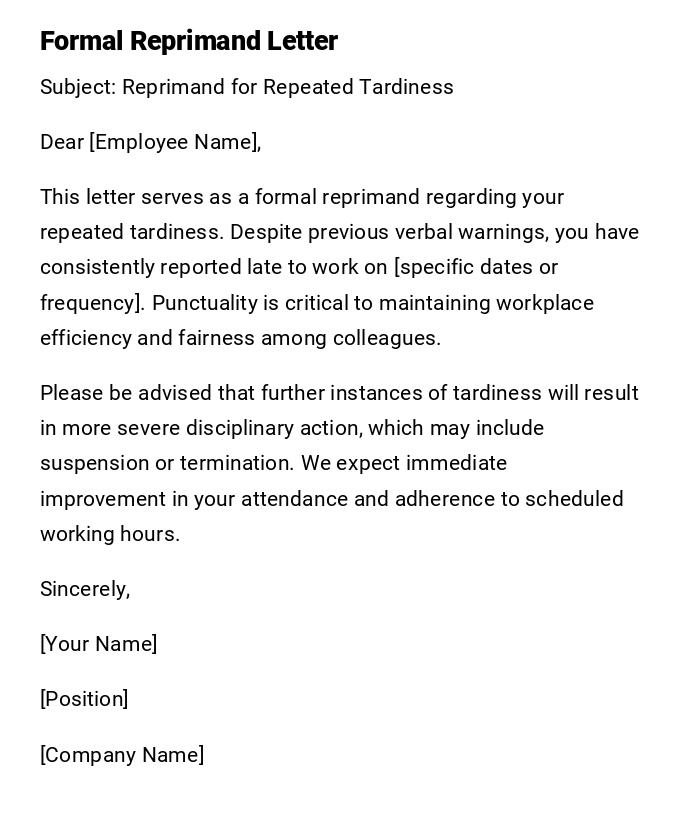
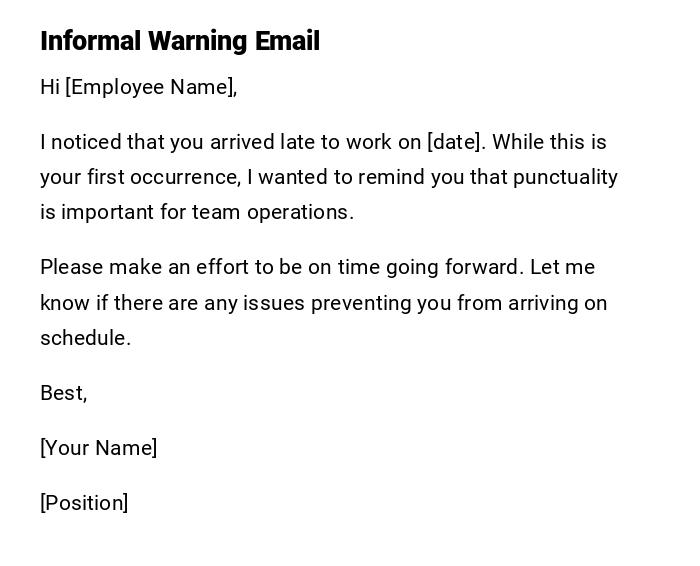
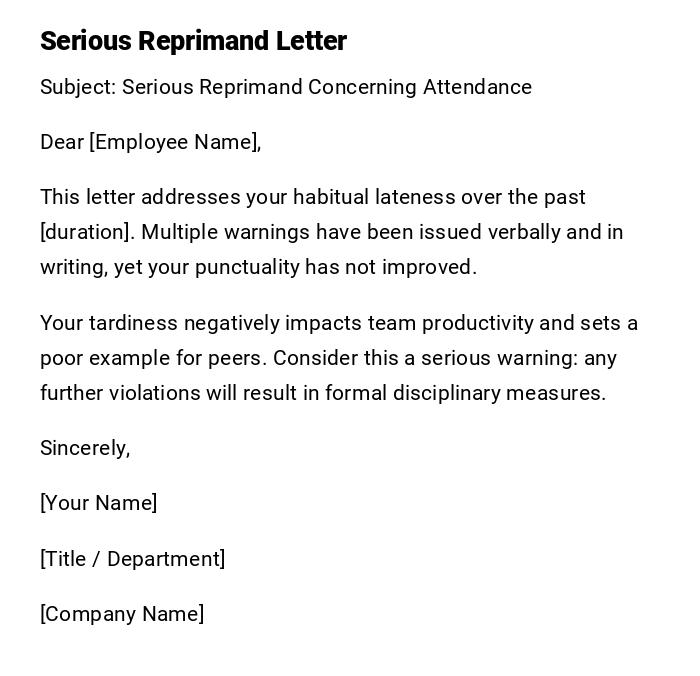
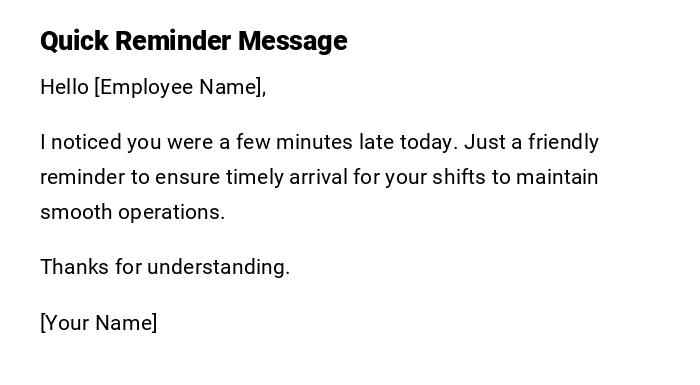
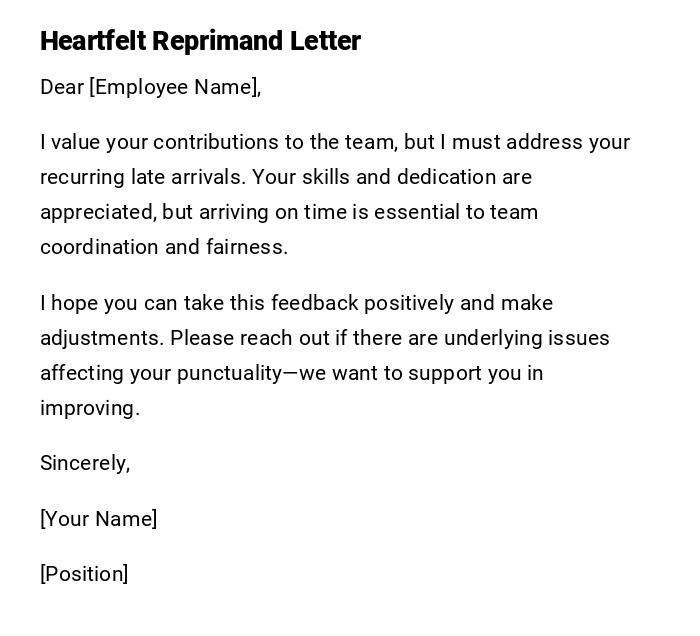
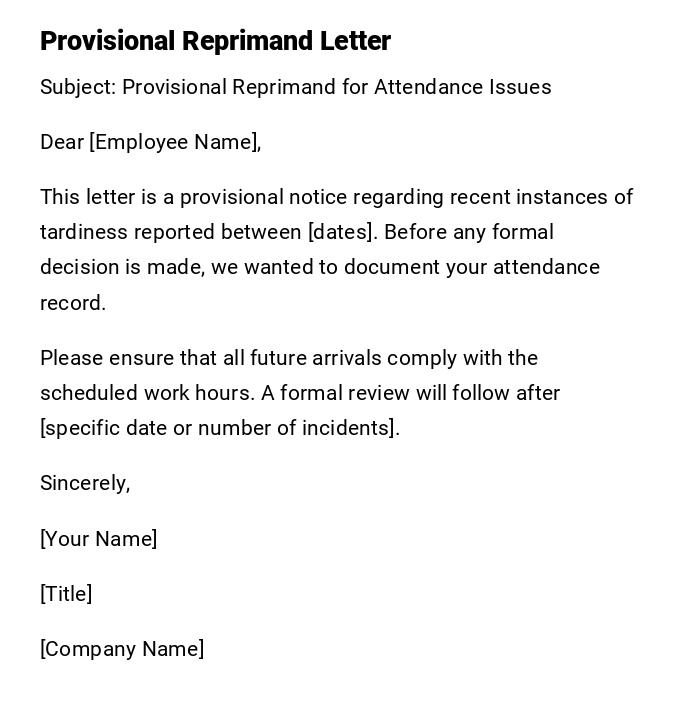
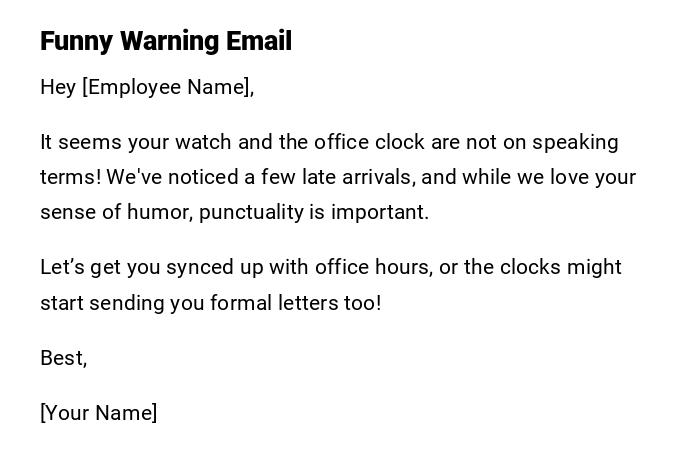

 Download Word Doc
Download Word Doc
 Download PDF
Download PDF